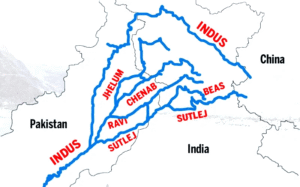The world witnessed immediate diplomatic and strategic reactions from India when it suspended the 1960 Indus Water Treaty with Pakistan. One of the longest rivers in the world the Indus River moves across China India and Pakistan as it nourishes millions of residents. Throughout history the river supported the survival of inhabitants living beside it as ancient civilization people like the Indus Valley Civilization prospered in its vicinity thousands of years ago. Throughout the centuries the Indus River has been a resource that India and Pakistan shared yet it became the center of political conflicts causing diplomatic tension between these nations.
After terrorists launched their violent attack against Pahalgam residents of Jammu and Kashmir region killing 27 people and injuring 17 citizens along with visiting tourists India made this decision. Official reports from India indicate Kashmir Resistance became responsible for the attack while exposing connections between terrorism organizations located at Pakistan.
This diplomatic move by India now represents both heightened efforts against cross-border terrorism and complete diplomatic along with strategic response control capabilities.
What is the Indus Water Treaty?
The World Bank endorsed the creation of the Indus Water Treaty which Prime Minister Jawaharlal Nehru from India and President Ayub Khan from Pakistan signed in 1960. This agreement dictates how all Indus River tributaries and their five branches should be used. The treaty provided India with the eastern rivers Ravi, Beas, and Sutlej function access yet Western area rivers went to Pakistan through the water rights with Indus, Jhelum, and Chenab.
The treaty managed to endure multiple Pakistan-India conflicts and border clashes across many decades though both countries maintained tense relations. The treaty served as an unprecedented case of successful bilateral cooperation between Pakistan and India as nuclear powers.
The Trigger: Pahalgam Terror Attack
Militants armed with heavy weapons launched an attack against tourists in the Anantnag district at Pahalgam on April 22nd of 2025. Through their synchronized attack 27 people lost their lives with 25 being Indian nationals and one dead Nepalese citizen. Seventeen others sustained serious injuries.
The Indian intelligence identified Kashmir Resistance as the perpetrators while revealing that this upstart group received operational and logistical backing from Lashkar-e-Taiba and Hizbul Mujahideen who operate from Pakistani soil.
Following the attack numerous Indians expressed sorrow and rage throughout every part of the country. The nation focused on mass demonstrations combined with prayer vigils and calls for swift intervention after the attacks. The Indian government required immediate decisive action upon facing overwhelming domestic pressure.

The Brave Reaction of India
India’s decision to suspend the Indus Water Treaty is a strong political message in addition to a legal and diplomatic one. India is sending a message that terrorism cannot be separated from regional cooperation issues by suspending the cooperation specified in the pact.
Subrahmanyam Jaishankar expressed in a media briefing that India continues to maintain restraint by upholding treaty principles each time Pakistan caused provocations during several decades. Our national safety together with citizen protection requires immediate attention over all other considerations. According to External Affairs Minister Subrahmanyam Jaishankar it has become necessary to stop disregarding terrorist activities supported by neighbors extending beyond our international borders.
The government has established that the suspension represents a temporary cessation rather than complete treaty removal. The treaty will continue inactive until Pakistan proves through verifiable evidence that it can permanently stop terrorist activities conducted within its borders.
India’s Foreign Policy Has Undergone a Strategic Change
India’s choice to halt the Indus Water Treaty represents a major change in its arsenal of foreign policy instruments. India has historically used water diplomacy as a strategic tool with moderation. However, the latest incident has changed the national mood, and stricter restrictions are widely supported at home.
Analysts predict this action to create a pattern where economic deals along with environmental and humanitarian arrangements must meet security protocol standards. India establishes a clear border when it comes to terrorism because it will not accept it and countries that support such organizations will suffer reactions above standard diplomatic measures.
The path forward remains uncertain. Restoration of peace negotiations with Pakistan through credible counterattack efforts against terrorist organizations might enable the treaty’s return. An ongoing rise of tensions will produce more severe regional challenges with both human rights disasters and higher military spending.
For its part, The Road Ahead India appears willing to assume that risk. The message is unambiguous: diplomatic tradition will no longer be used as an excuse to compromise national security.
Final Thoughts:
The suspension establishes a fresh period of international diplomacy that demands treating terrorism fully during peace negotiations. The Indian decision about resolving issues will transform both India-Pakistan diplomatic relationships and regional approaches to security matters particularly regarding cross-border terrorist events. During this new era the world will observe closely to determine if this policy adjustment results in enduring peace or more conflict. India’s suspension of the water-sharing agreement indicates the great extent of New Delhi’s displeasure concerning Pakistan’s state-sanctioned terrorism practices.




